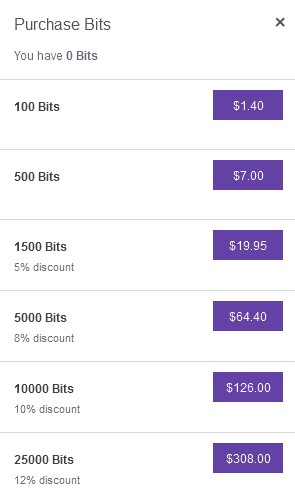Twitch introduces "Cheers," a new way to show support for streamers
As you may have already guessed, the goodwill doesn't come for free.
Twitch has introduced a new way for viewers “to show support and appreciation for their favorite broadcasters” called Cheering. By simply typing “cheer” in chat, followed by a number—“cheer100,” for instance—you'll be able to send a specially-emoted cheer to the streamer. The higher the number, the “louder” the cheer, and the more visually impressive the emote.
“If you’ve ever watched Twitch and wanted to show support, but you couldn’t do it the way you wanted, now you can Cheer,” Twitch wrote in blog post announcing the new feature. “Even if you aren’t the Cheering type, you can still benefit from Cheering on Twitch. Cheer Chat Badges will help you identify the regulars in new channels, animated emotes will draw your attention to important messages or moments, and since Cheering is in chat, streamers and their moderators can make sure that the Cheering in their channel is right for their community.”
There is a catch, however. Cheers require “bits,” and bits aren't free. They can be purchased in amounts ranging from $1.40 for 100, to $308 for 25,000, and while they can be spent in any amount you like, a cheer emote more visible than a small, grey triangle costs 100 bits. Past that, they come in 1000, 5000, and 10,000-bit denominations. Likewise with cheer “chat badges,” which are awarded at 1, 100, 1000, 5000, 10,000, and 100,000 bit tiers.
cheer100 Love your stream! pic.twitter.com/B6e9ZnN73kJune 27, 2016
“Our community loves to support their favorite broadcasters, and Cheering using Bits provides a fun new way to level up their appreciation,” Twitch CEO Emmett Shear said. “If channel subscriptions are the equivalent to holding season tickets for your favorite sports team, Cheering is like getting a crowd wave started during the game.”
Cheering is currently in beta and thus restricted to a little over 60 Partner channels, but it will eventually be rolled out to more, “as we refine the program based on community feedback.” Taking that as an invitation, here's some from me: $14 for the 1000-bit cheer, which is right in the middle of the pack and thus not really remarkable in an meaningful way, is a lot of money. The hypothetical person in the animated GIF used to demonstrate cheering in action owns 10,000 bits, which means he or she at some point dropped $126 bucks ($165 in my country) in order to be able to cheer for streamers—some of whom, it's worth bearing in mind, people are already paying for through subscriptions.
More revenue opportunities for streamers is never a bad thing (in theory, anyway) and Twitch has confirmed that there will be revenue sharing for cheers, although the precise percentages haven't been revealed. But is using paid-for emotes to attract attention and determine the “regulars” really a good way to build a healthy community? At these rates, I have to think that it's more likely to leave people behind.

The biggest gaming news, reviews and hardware deals
Keep up to date with the most important stories and the best deals, as picked by the PC Gamer team.

Andy has been gaming on PCs from the very beginning, starting as a youngster with text adventures and primitive action games on a cassette-based TRS80. From there he graduated to the glory days of Sierra Online adventures and Microprose sims, ran a local BBS, learned how to build PCs, and developed a longstanding love of RPGs, immersive sims, and shooters. He began writing videogame news in 2007 for The Escapist and somehow managed to avoid getting fired until 2014, when he joined the storied ranks of PC Gamer. He covers all aspects of the industry, from new game announcements and patch notes to legal disputes, Twitch beefs, esports, and Henry Cavill. Lots of Henry Cavill.

